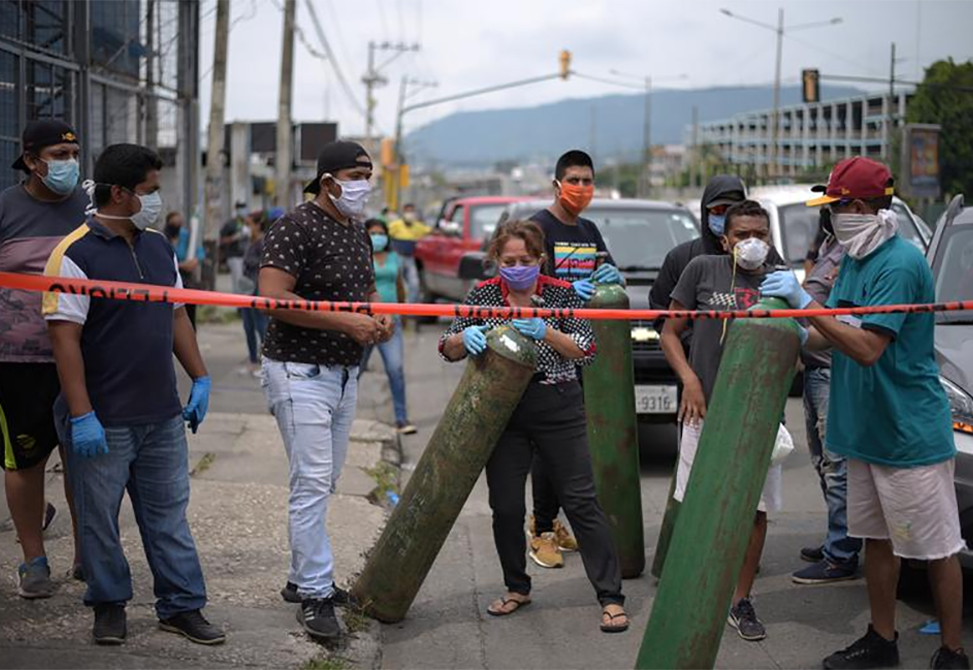Dispatch from Quito
By Nathan Gill
Nathan Gill is a graduate student in Latin American history at UNC-Chapel Hill and a 2020 Fulbright-Hays scholar in Ecuador. He worked as a news reporter in Latin America for eleven years and was the bureau chief for Bloomberg News in Ecuador from 2010 to 2016.

People wearing face masks wait with oxygen tanks at a private distributor that
recharges tanks in Guayaquil, Ecuador, April 9th.
Image taken by REUTERS/Vicenter Gaibor del Pino.
I’ve watched the coronavirus crisis unfold from a quiet street in the suburbs of Quito, where I’m living with my family while on a research fellowship in Ecuador. After an early outbreak overwhelmed the port city of Guayaquil, many thought the rest of the country would also become a global hotspot. But relatively strict quarantine measures seem to have stemmed the outbreak for the moment. Still, it’s clear that what Ecuadorians are calling la cuarentena is exacting a terrible cost.
With over 7,000 suspected deaths from the virus in Ecuador, almost all aspects of normal life have ground to a halt. For all but essential workers, we are on a 2 p.m. curfew. Even when we can go outside, most activities are banned and regional and international travel restrictions have left refugees, tourists, and others stranded at the borders. Most public buses no longer run, there are few taxis, and private cars can only be driven once a week. When people do leave home, many walk or use bicycles.
There have been few shortages so far, but a trip to the grocery store can take up to three hours and involve standing in lines that circle the block. As I waited for my turn one-day last month, I stood behind a masked woman who would periodically spray herself with rubbing alcohol from head to toe. Even though it was sunny, the man behind me was wearing a bright-yellow rain suit, and I pulled nervously at my size-too-small rubber gloves and tried not to touch my face. To make things stranger, social-distancing instructions blared from loudspeakers normally used for volcano warnings and municipal trucks patrolled the streets reminding everyone to be careful. Hidden behind our personal protective equipment, we all looked at each other with silent suspicion while waiting for our turn inside.
More recently, I borrowed a car from a friend to run some errands. It had been a month since I’d left home and I was surprised at how many people were out. The streets were full, most small shops were open, and masked pedestrians and cyclists were everywhere, taking up whole lanes of the road in some parts of the city. Street vendors who used to clean car windows at stoplights are now offering to disinfect vehicles with spray pumps. I saw what appeared to be a group of refugees walking north, pushing a baby stroller filled with their belongings while a man carried an infant. Further on, a half-dozen adults with hiking backpacks were walking on the side of the road. Only a few of them had masks and they almost certainly had nowhere safe to shelter.
Even for families who haven’t lost their jobs or gotten sick, the social separation has taken its toll. My partner’s grandmother passed away in Quito on Mother’s Day. She was in her 90s and didn’t have coronavirus, but all public funerals have been banned. Instead, her more than one hundred children, grandchildren, and great-grandchildren virtually gathered on YouTube to watch a mass in her honor. The audio was awful and people were worried because the priest didn’t take communion himself. We hope to bury her ashes together as a family someday soon.
For others, the anguish of not knowing when or if they will be able to return to their jobs has been as scary as the virus, leading many to accept wage cuts and furloughs in the hopes of not losing their jobs permanently. My daughter’s elementary school has cut their fees in half and her teachers, who send us home-videos every day with activities to complete, have accepted a 25-percent pay cut to help the school stave off bankruptcy. I’ve heard others say they’ve renegotiated their rent, or are trying to take out small loans to help cover expenses until things return to normal. But normal still seems a long way off.
In Ecuador, even before the coronavirus destroyed global demand for its crude oil, fresh-cut flowers, and other exports, the country was struggling economically. A government-debt crisis followed by austerity measures last year sparked nationwide protests that grew so violent the president was briefly forced to flee the capital while the military engaged in running street battles with angry protesters. The coronavirus has only made that economic distress worse, leaving many wondering how long they can endure. But in a sign of the times, there has been little opposition to the plan to remove the controversial fuel subsidies that triggered last year’s protests, and new austerity measures and tax hikes are being debated by congress now.
Yet despite Ecuador’s fame as a “banana republic,” the government response here has been far more competent than what I’ve witnessed from my home state in North Carolina, or even the White House. Here, there are no armed virus-deniers stalking politicians and threatening minorities in the middle of a humanitarian crisis, as happened in Raleigh this month. And while families are suffering terribly, no one is suggesting that people inject bleach or pretending that life will go back to normal anytime soon. Why would they? This is Ecuador, not Macondo.

